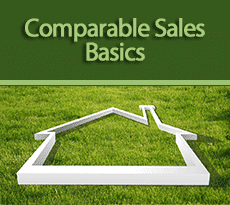 The term comparable sales refers to the price of any similar land or property generated at this time compared to the potential market sale value of your property, it is the most commonly used appraisal method in residential real estate. The comparable sales are used to appraise the residential homes and properties in an area. Therefore, it is a very important factor, which determines the worth of your house or any other property in the local market. And since it affects the appraisal of your property, it is important to know some of the basics of comparable sales so you can make sure your house is evaluated properly.
The term comparable sales refers to the price of any similar land or property generated at this time compared to the potential market sale value of your property, it is the most commonly used appraisal method in residential real estate. The comparable sales are used to appraise the residential homes and properties in an area. Therefore, it is a very important factor, which determines the worth of your house or any other property in the local market. And since it affects the appraisal of your property, it is important to know some of the basics of comparable sales so you can make sure your house is evaluated properly.
Understanding How Comparable Sales Work
Generally when an appraiser puts a value on your property, he or she does so by comparing it to another property close to yours. Depending on the size of your property they will look at similar homes within a half-mile radius of your home that sold within the previous 180 days, your property will be judged and a price fixed. Where no other property match the above mentioned criteria, then the appraiser uses his discretion to either go further away from your property or use some other method to put a value on it.
As we all know, no two homes are the same. Something or other will make a difference, whether it is the material used to build the house or the condition of the material used at this moment. And since the appraiser values your property using the comparable sales technique, the homes near your property with similar amenities and same number of rooms make a big difference on how much your house is worth
How Comparable Sales Can Affect Your Property Appraisal
Abnormal Comparable Sales: There are instances where a property is sold by different means and reasons than just a seller’s wishes to actually sell it. It could be that a seller had to sell the property at a price lower than the debts incurred for building it.
Another possibility is that, due to the mortgagor’s inability to pay the monthly mortgage bills, the lender foreclosed on the property. Pricing your property in comparison to such properties could lead to a loss. So, some ways to solve this is to ask for reappraisal and request the lender to get an appraiser with knowledge about your area.
Home improvements: Any property is appraised based on its condition during the sale. If you spent a fortune on refurbishing your property before putting it up for sale, but nobody in your neighborhood has changed anything, this could also reduce your house’s value. Discuss with your lender or realtor which improvements will improve the price and which will not.
It should be noted that a lender does not have the right to approach an appraiser before or after he comes to appraise the property. However this rule does not apply to buyer and seller who can regularly be in contact.


About The Author: Karengustin
More posts by karengustin